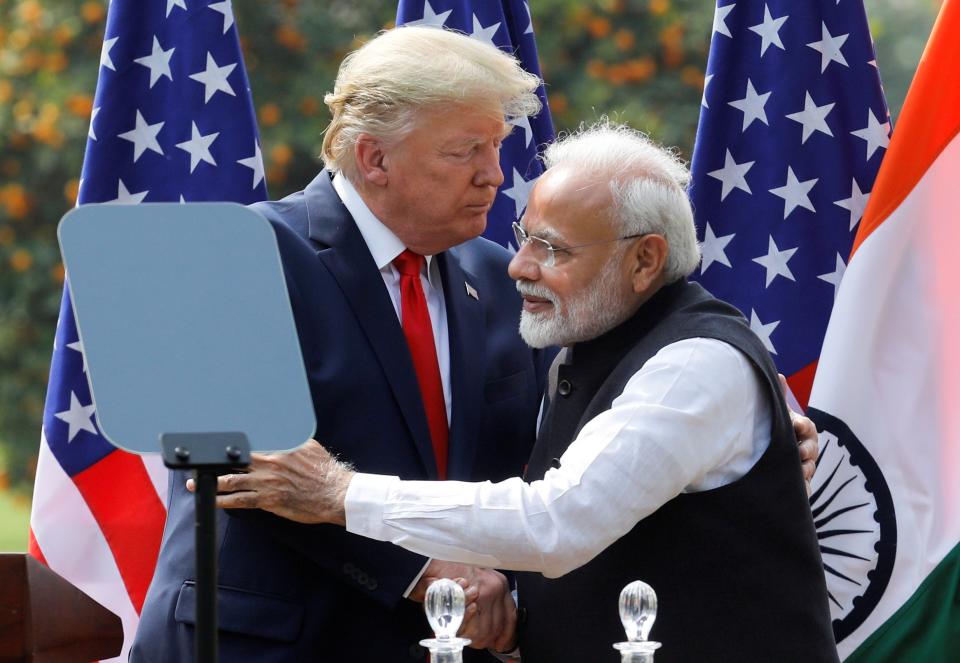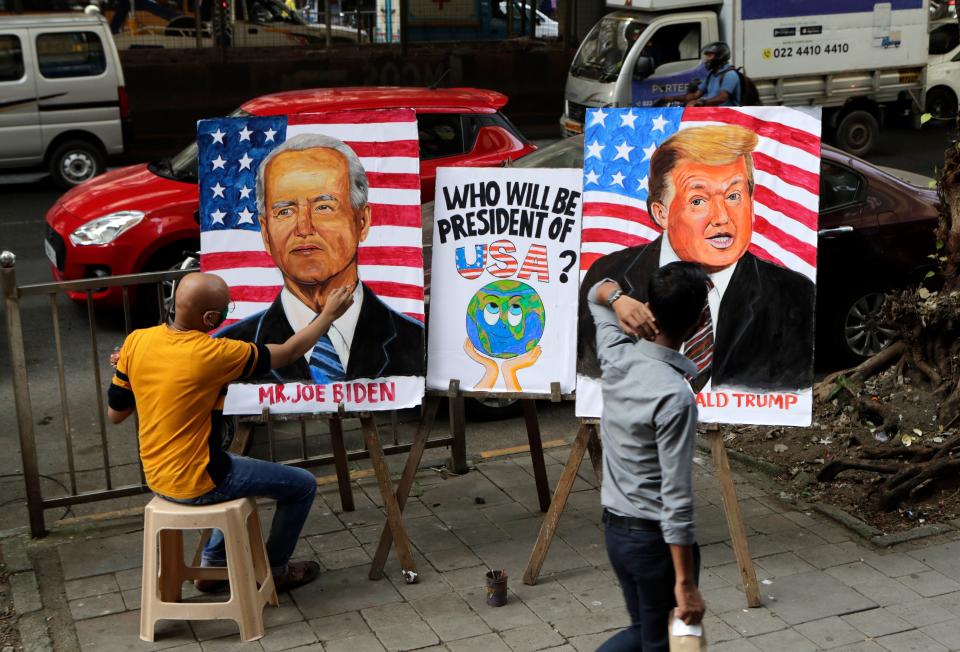Will the US-India ‘bromance’ continue if Donald Trump is voted out of the White House?

Irrespective of who wins the elections on Tuesday, India’s relationship with the US has been changed irrevocably during the last four years with Donald Trump as president.
India, which has for decades struck a fine balance of strategic autonomy between global superpowers, is now more clearly aligned with the US than it has been at any time since independence.
This development goes far deeper than the much-vaunted “bromance” between Trump and India’s prime minister Narendra Modi, with its roots in a shared need to face up to a growing and emboldened common threat: China.
Since Trump came to power, India has been engaged in two major military standoffs with its giant neighbour to the east – at Doklam in 2017, and the ongoing crisis in Ladakh that saw 20 Indian soldiers beaten to death by the Chinese army in June.
At the same time as India-China relations have hit a nadir not seen since a 1962 war, Trump has repeatedly clashed with Beijing, engaging it in a protracted trade war throughout his term and in recent interviews naming China as the US’s “greatest adversary”.
During a visit to Delhi this week, US Secretary of State Mike Pompeo said America would “stand by India” in the fight against China, and paid tribute to the soldiers killed in Ladakh. He is in the process of taking Trump’s anti-China message on a tour of Asian nations, from Sri Lanka and the Maldives to Indonesia and Vietnam.
And whereas India has in the past emphasised its strategic autonomy, in recent months Delhi and Washington have together been the driving force behind a revival of the full Quad of nations – the US, Japan, Australia and India – which all have disputes with China as their one major common factor. Australia will be involved in the annual Malabar naval drills next month for the first time in 13 years.
As part of their visit to India, Pompeo and US Defence Secretary Mark Esper on Tuesday signed with their Indian counterparts the Basic Exchange and Cooperation Agreement (BECA) treaty, which allows India to use advanced American geospatial data in its military targeting systems for the first time.
It was the last of four foundational military agreements between India and the US signed in the last two decades – three of which have come since August 2016.
This process of closer military alignment, though accelerated rapidly under Trump, has been many years in the making as India took “a lot of time to analyse and understand the implications”, former Indian army chief General Nirmal Chander Vij tells The Independent.
“Over this period we have realised that Indian interests and American interests are [going] in the same direction and for the same purpose – and for that very reason, India has gone ahead and signed the foundational military agreements.
“Our interest has never been to make an anti-China alliance, but to safeguard our security and economic interests, whatever it may amount to,” General Vij adds.
Closer military ties between the two countries is not just about security – it’s also big business. From next to zero in 2008, the value of India-US defence trade has rocketed to around £20bn in 2020, with deals including Seahawk and Apache helicopters and other large aircraft, infrared and countermeasure technology and more.
It’s a trade that supports thousands of jobs in both countries and is only likely to grow as the US looks to market India its fighter aircraft, which Delhi previously sourced from Russia and now gets from France.
The “robust American push for inter-operability” of their militaries with India suits Trump’s “America First” policy, says the veteran Indian diplomat M K Bhadrakumar, “with its heavy emphasis on job creation in the US economy as well as the pressing need to co-opt India as a key partner in the Indo-Pacific strategy”.
He notes that India, with no domestic arms industry to speak of, now sees the US as a key source of advanced military technology, adding that “one thing the India-China standoff has highlighted is our shortcomings in defence preparedness”.
China has made its unease at growing India-US closeness clear, and spoke out at several times during Pompeo’s Asia tour this week. Chinese foreign ministry spokesperson Wang Wenbin accused the US of pursuing an Asia-Pacific strategy based on a “Cold War mindset” designed to “uphold the dominating role of the United States and its hegemonic system”.
Wang called on US leaders to stop “sowing discord between regional countries, and undercutting regional peace and stability”. “China is an opportunity, not a threat, a partner, not a rival,” he said.
There is no question that China is “definitely irked”, says General JJ Singh, another retired chief of the Indian army, who has also served as governor of the Indian border state of Arunachal Pradesh – which China refuses to recognise.
“There is no other country but India which can measure up to [China] and face them in all dimensions,” he says, while admitting that “we have a lot of ground to cover [to] catch up with the Chinese”.
Experts agree that while the shift in India-US relations of the last four years cannot be undone, what happens next depends a great deal on who occupies the Oval Office.
Dr BR Deepak, professor of Chinese Studies at Delhi-based Jawaharlal Nehru University’s Centre of Chinese and Southeast Asian Studies, says a Biden administration “may not be as vocal as Trump’s team against China even though during elections both of them have attacked China vigorously”. “Post election, if Biden wins, he may adopt a balancing strategy vis-a-vis China,” he says.
Bhadrakumar, who served as India’s ambassador to Turkey and Uzbekistan, says there is likely to be a “reset” of US foreign policy if the Democrats win the election.

“I am not sure whether a US-led Asian alliance against China will continue to be a priority for Joe Biden,” he says. “During his interview on 60 Minutes last week, Biden drew a distinction between Russia as a threat and China as a ‘competitor’. And he implied that the management of the relationship should be such as to obviate the need for the use of force.”
Whereas Trump neglected his trans-Atlantic partnerships and failed to carry European allies with him in the trade war with China, Biden will almost certainly “revive the trans-Atlantic alliance as a key template of his foreign and security policies”.
This, Bhadrakumar says, will inevitably prompt the US to prefer “a policy of engagement with China — despite differences — which is what their European partners such as Germany or Italy will prefer, because of their dynamic trade and economic ties with China.”
As far as India is concerned, Singh says that in geopolitics “there are no permanent friends and no permanent enemies, but permanent national interests”.
“So, no matter who wins the US elections, those in the system are bound to tell him about the US's national interests and keep American interests first. In the world today, the US needs India on its side and without that the US will find it very difficult to exercise a predominant role in the world.
“India is a ‘swing state’ in the global balance of power. So, even if there is a change in the US administration, India figures as an important factor,” Singh says.
On balance, Singh suggests India has done well out of the deterioration of US-China relations under Trump, and may continue to do so as long as the Republican is in power. “During the US-Russia Cold War, China benefited heavily from the US. Today, India is in a similar condition when the US and China are at loggerheads,” he says.
Read more
Kamala Harris fever is gripping India – but not everyone is convinced

